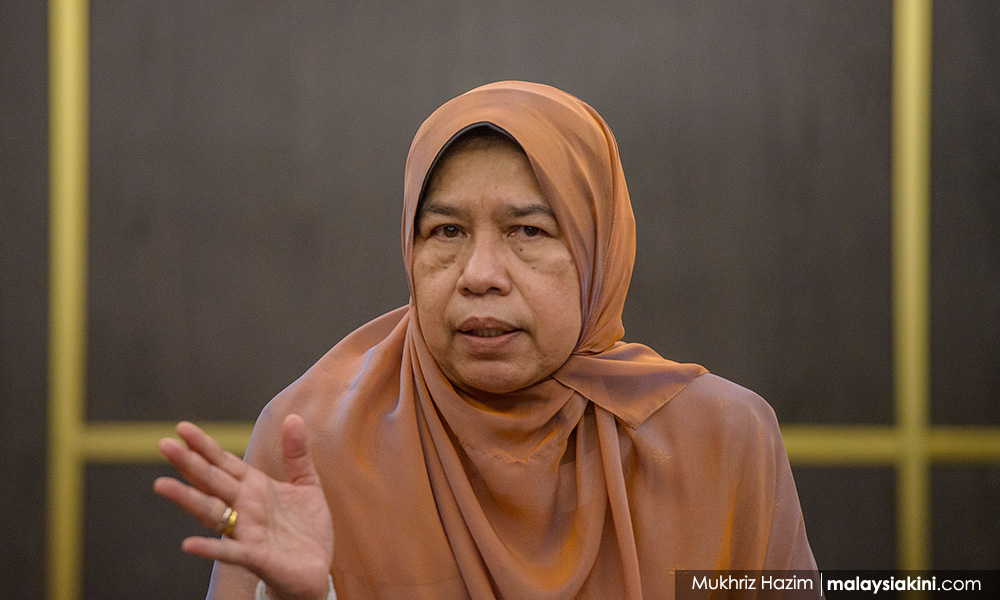The issuing of a public statement by the Yang di-Pertuan Agong regarding the proposed revocation of the emergency ordinances (EO) on July 29 was "not proper", said Housing and Local Government Minister Zuraida Kamaruddin.
Zuraida said that the Agong, who was bound to act on the advice of the cabinet in most matters, could have engaged the cabinet first to seek clarification before issuing the statement.
She said this on the Consider This talk show on Astro Awani last night.
To questions from the show hosts on the revocation of the EO, Zuraida said as a cabinet member, she believed that the process was above board.
"(Malaysia has) a constitutional monarchy where (the monarch) has to get the advice of the cabinet and prime minister in anything (that the monarch) wants to do.
"I am a bit upset. Anything that they are not clear (with), they should always call the Prime Minister's Office. (Moreover,) the prime minister (is granted an audience by the Agong) once a week before the cabinet meeting," said Zuraida.
Zuraida explained that the cabinet had decided to revoke the EO on July 21 and, in accordance with due process, presented the decision to the Agong.
"The king is supposed to listen to what is being recommended by the cabinet. So, they have to listen to this. There should have been discussion and engagement.
"There shouldn't have been any kind of public statement which, I think, is not that proper in this kind of constitutional monarchy system," she said.
When pointed out that royal assent was necessary for any law, Zuraida disagreed.
"If the legal adviser to the monarch is very careful in interpretation (of the law), he will know that even if the monarch didn't agree, also in 30 days' time it would be resolved or taken six months down the road.
"So, it is very much a waste of time to argue on this when we know that jolly well it would end up in something that is up to the government and cabinet to decide and the monarch has to listen.
"If (the palace) needs clarification, we will clarify. So that should be the way," said Zuraida.

The 30-day stipulation referred by Zuraida likely refers to Article 66(4) of the Federal Constitution which states that the Agong "shall within 30 days after a Bill is presented to him assent to the Bill by causing the Public Seal to be affixed thereto".
Article 66 refers explicitly to Bills passed by Parliament. It is uncertain if the EO is covered by this law.
As for the six-month stipulation, Zuraida was referring to Article 150(7) of the Federal Constitution, which states that the EO, unless annulled through Parliament, will be in effect for six months after the expiry of emergency.
When asked for her assessment of the Agong's claim that de facto Law Minister Takiyuddin Hassan had misled Parliament on the revocation of the EO, Zuraida defended him.
"If you listen carefully to what was being said - word by word - he has said nothing with regard to the ordinances. He said that the cabinet has revoked the ordinances on July 21.
"So that was the cabinet decision. There's nothing wrong with that," she said.
On July 29, the Istana Negara issued a rare reprimand on the executive. Among others, the Agong was "deeply disappointed" that Takiyuddin claimed in Parliament on July 26 that the ordinances were revoked by the cabinet when royal assent was not granted.
Instead, the Agong argued that the EO had to be debated in both Houses of Parliament to fulfil Article 150(3) of the Federal Constitution.
A debate would eventually result in a vote on whether to keep the EO which could have potentially exposed the extent of Prime Minister Muhyiddin Yassin's level of support in the Dewan Rakyat. - Mkini




No comments:
Post a Comment
Note: Only a member of this blog may post a comment.